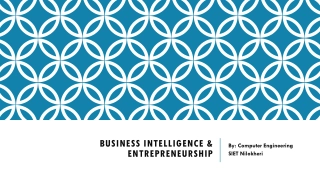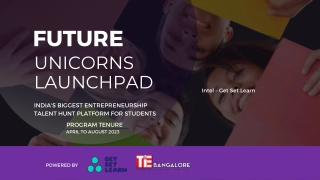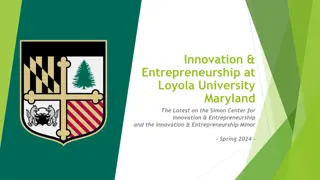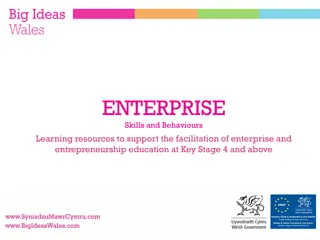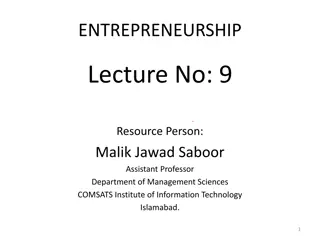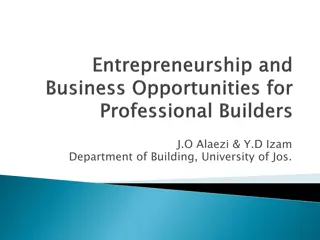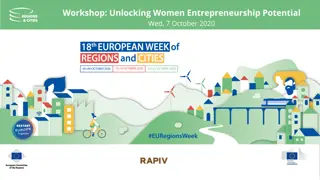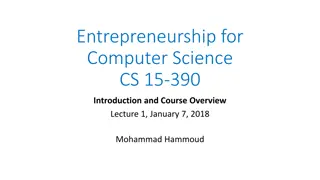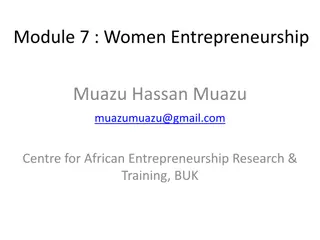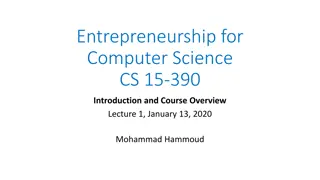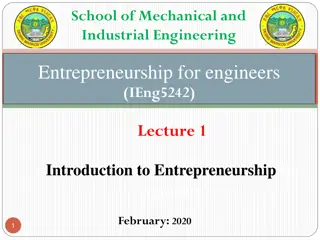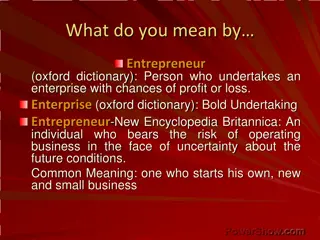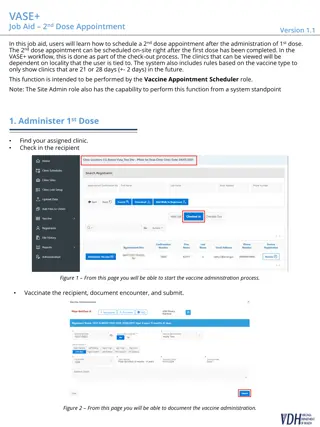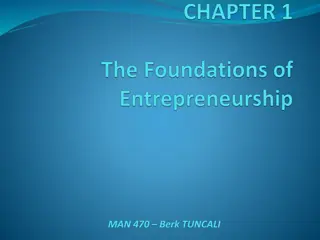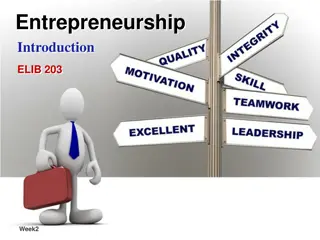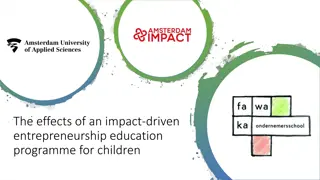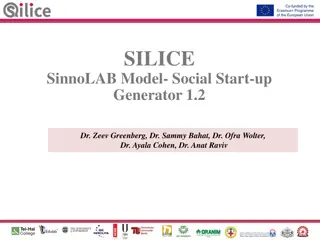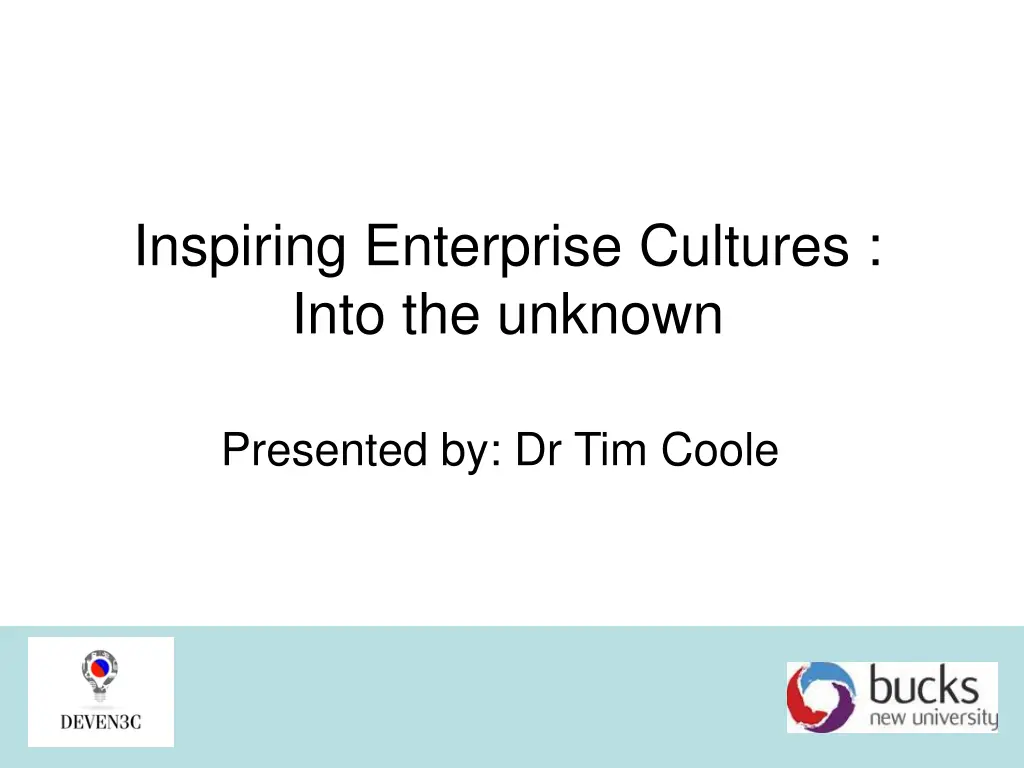
Innovating Enterprise Cultures Towards Success
Explore the dynamic landscape of enterprise cultures, from essential structures to emerging trends. Dr. Tim Coole introduces key aspects such as enterprise models, practical applications, and the government's efforts to support diverse entrepreneurial endeavors. Delve into the realms of social enterprise, entrepreneurship, and the evolving role of enterprises in today's society.
Uploaded on | 0 Views
Download Presentation

Please find below an Image/Link to download the presentation.
The content on the website is provided AS IS for your information and personal use only. It may not be sold, licensed, or shared on other websites without obtaining consent from the author. If you encounter any issues during the download, it is possible that the publisher has removed the file from their server.
You are allowed to download the files provided on this website for personal or commercial use, subject to the condition that they are used lawfully. All files are the property of their respective owners.
The content on the website is provided AS IS for your information and personal use only. It may not be sold, licensed, or shared on other websites without obtaining consent from the author.
E N D
Presentation Transcript
Inspiring Enterprise Cultures : Into the unknown Presented by: Dr Tim Coole
Structure What do we know? Various Enterprise Flavours Enterprise and Enterprise Models Practical Applications Enterprise Perspectives The need for generic materials Business Support A Partnership Approach Key Learning Points
Profile of our students 4% are already self-employed 29% have a parent who runs their own business 45% intend to become self-employed (either probably or definitely ) 40% would expect University support to help them with start- up
Government is attempting to build an enterprise culture encouraging a dynamic start up market. It is also shifting the emphasis to: Social Enterprise and Entrepreneurship Ethnicity Minority Groups Female Entrepreneurs Rural and Urban businesses Disabled and disadvantaged groups Strong local partnerships Convert informal market businesses
Enterprise and placements: Into the unknown Where do we start? What are the tensions / barriers? What is the concept? What is an enterprising organisation? What are rewards of getting involved? Do we have the capability? Do we want ownership? Is it credible? What approach should we adopt? How does it relate to employability & placements?
Which quotes set the most appropriate image? (Quotes from the Enterprise Insight Conference )
It (Enterprise) can be seen as: business and economic understanding . financial literacy Gordon Brown need to create business and business teachers . a teaching profession less prejudiced against business Digby Jones
enterprise is not fundamentally about taking risks but about identifying and taking opportunities we wish to refocus upon enterprise and not just entrepreneurship we cannot possibly supervise enterprise : we have to give people ownership & control Martin Griffiths Martin Glen
enterprise thrives on networks Kevin Steele the challenge is to get organisations to run in an enterprising way George Cox there is an over reliance in business upon academic skills as opposed to feeling skills Martin Glen
. some Higher Education challenges on the demand side
the biggest problem is what we do with graduates - there is no acceleration of demand for knowledge workers Phillip Brown we will never achieve the enterprise culture with the civil service as it is today Sir Michael Bichard young workers will face 20 changes of job Kevin Steele the world of work is being reshaped George Cox
engineering, not business schools, are better geared to create entrepreneurs Karl Schram are we creating examination junkies? are we giving students time to breathe? Phillip Brown HE has an anti-vocational attitude - it is against skills Sir Michael Bichard
Which Conceptual Model is appropriate? Model 1 A business led teaching model (Derived from dominant corporate culture and international experience with the focus upon starting and developing a business?)
Sprinkling of behaviour support Rational, reductive, objective, corporate, information processing brain Myopic business view only Instructional Explicit Knowledge Ingestion HEROIC heart Functional arm Add on arm business plan gut New Venture Leg Capitalist Market Model Growth Business Leg FRANK N. STEIN Role Models Projects
An entrepreneurial capacity creation model: 2 Coping with high levels of complexity and uncertainty in society in a turbulent global environment. (Personal entrepreneurial skills development and capacity to design and operate entrepreneurial organisations)
A philosophically sound model of Entrepreneurial Learning
Rich Growth Of Entrepreneurial Attributes Vision and Feel for Way Of Life Emotional Intelligence Capacity for Experiential Ingestion (tacit knowledge) Conative Affective And Cognitive Learning Entrepreneurship Values Holistic Management Arm (Know How) Strategically Intuitive Gut Trust building Relationship Arm (Know Who) Entrepreneurial management in different contexts Entrepreneurial Organisation Design and Development Ideas Harvesting and Evaluation Project Management You or Me? Globalised World of Uncertainty / Complexity
What is Enterprise? Enterprise is an inclusive concept the context in which subject disciplines can be explored challenging environment an approach, through skill development, which can be taken to the exploration and discovery of a discipline. skills of being enterprising corporate perspective (as intrapreneurship ) creation of new ventures, social programmes and the exploration of new opportunities
Practical Approach: meeting the needs of partners Government, Regional Development Agency, Professional, Academics, Business and Aspirant Graduates
Towards the Enterprising University What needs to Change? What can change? How?
Enterprise and placements: Into the unknown Where do we start? What are the tensions / barriers? What is the concept? What is an enterprising organisation? What are rewards of getting involved? Do we have the capability? Do we want ownership? Is it credible? What approach should we adopt? How does it relate to employability & placements?
Are pedagogic changes required? valuing teaching about rather than teaching to Increasing the range - changing the balance between what is taught and how it is taught Valuing tacit/experiential knowledge Re- codification/organisation of knowledge More scope for learning by practice Imaginative assessment processes
Can universities adapt? Isorganisational change required? Entrepreneurial v Managerial design/culture Re-balancing stakeholder relationships/values? Becoming Learning and Learned organisations Research/development v Research/publication Staff typologies status and rewards ? Contract with the student? Open door to entrepreneurs and IPR
What are the requirements for an Integrated Model? Is it possible? University wide with VC support Innovative pedagogy Life long learning approach in all subjects Acceptance and integration of entrepreneurs and SMEs into universities Venture Capitalist support & role Academic partnerships with business and the community to enhance employability Social and economic research and development Active stakeholder participation Open approach to IPR, spinouts & investment
The need to embed the Enterprise Culture as: - ways of organising things - ways of doing things - ways of seeing things - ways of feeling things - ways of communicating things - ways of learning things
Skills & Process Creativity / Innovation Research / Marketing Strategy / Project Mgt Team working & Communication Skills Financial Skills Softer - networking Have ideas Do something about them Take advantage of opportunities to bring about change Make things happen
What do aspirant graduate entrepreneurs need? Confidence Capability Knowledge of environment Awareness Appropriate values
Enterprise Materials Supporting Entrepreneurship Skills in Graduates Awareness Understanding Appreciation Recognition Knowledge of business start up as a graduation option
Enterprise Materials + Supporting Entrepreneurship Skills in Graduates Holistic Thinking Innovation Creativity Shared learning Networking / team working learning to think!
Enterprise Education: an approach Motivation and Confidence Abilities and Skill Development Ideas (in relation to market) Resources Planning and Operations (tools) Discipline or Sector or Industry Strategy and Vision IDEA PROVEN IDEA PLANNING AND DEVELOPMENT READY TO START BUSINESS GROWTH MATURITY EXIT STRATEGY CURRICULUM SUPPORT Materials including Publications, Assessment etc. Advisors and Expertise both individual and organisational Organisational and Individual Best Practice Networks, Linkages and Web sites Workshops and Dissemination Incubation and External Business Support / Grants
MELT Matrix Abilities & Skills Development 2 Planning & Operations 6 Motivation 1 Ideas 3 Resources 4 Strategy 5 Emerging strategy development Idea generation techniques A. Idea Triggers to start-up Idea generation Gap in the market Resources Market information Market segmentation B.Proven Idea Drivers Self knowledge Feasibility study Techniques C.Planning & Development Professional expectations Strategy development Personal motivation Planning skills Market analysis Business plan Utilising Professional resources D.Ready to Start- Up Communication strategy Entrepreneurial Marketing Personal needs Negotiation Practicalities
Business Support Provided Early stage support: Foundation ideas evaluation, feasibility studies, business planning Development early stage trading, resource identification Exit growth strategy, incubation exit plan Bespoke programmes specific to the needs of graduate business include: General mentoring sounding board, business research, business mechanics, personal support and coaching, Access to business professionals (solicitors / IP lawyers/ accountants, investment support) Expert Mentors Networking Opportunities (external and internal) Training programmes Access to physical space and resources
Finance Bright Ideas Fund Proof of Concept Fund Feasibility study grants Committed bank managers Entrepreneurial accountants to match businesses to their clients funds Commercial lawyers to package the deals On site advisors who access funds Regional Venture Capital Funds Yorkshire Association of Business Angels
What does this mean? Can it be applied? Enterprise Activity at Leeds Metropolitan University The Institute for Enterprise a Centre of Excellence in Teaching and Learning in Enterprise Education Business Start up @ Leeds Met a non accredited route Centre for Graduate Entrepreneurship in Yorkshire a virtual network of Yorkshire Universities
Our achievements Thousands of innovation, creativity & enterprise learning opportunities New Material developed Academic staff trained Clients in the business incubators Students on entrepreneurial summer schools Role model case studies written & enterprise videos produced Web site & Interactive CD-Rom delivered to stakeholders Annual Enterprise Activity and Entrepreneurial Career Aspirations Survey Results published Talent Showcase, Bar Wars and Promoters Challenges successfully run Regional Business Concept Competitions held Regional Incubator Business Award launched
Our Vision increase and deepen its impact across a wider teaching and learning community vibrant, dynamic entities with a visible presence in their institution, engaging directly and purposively with student learning
Enterprise : Transforming Teaching, Learning & Employability Capacity: Enterprise Caf : resources and interaction Faculty Pioneers & Enterprise Fellows Curriculum Evaluation and Scholarly Research projects Staff Development Curriculum Projects Student Placements
Space & Vision Flexible & Secure Multi functional & multi purpose Innovative, Creative & Inclusive Showcase Embracing our communities Wireless & Engaging
Seeking Your Ideas! How could this aid placements? What would you like & need ? How would you use the space and what would it look like? What resources would assist you? What does enterprise mean to business and equally to your students? Who are your enterprising businesses and what methods do they use?
Ideas so far. Market research space Academic common room space Networking space for businesses & professionals Multi-media facilities - wireless Presentation space - externals / families Joint assessment Enterprising methods / approaches Enterprise week / month per faculty Final year demos / presentations / shows CHALLENGE: WHAT WOULD YOU NEED TO CREATE ENTERPRISING STUDENTS?
Future Enterprise Strategy between Universities and their communities To encourage links with Schools, FE colleges & international universities To facilitate local and regional business clubs To host professional membership groups To continue to work with the National Council for Graduate Entrepreneurship To innovate with respect to Enterprise in Universities To provide a seamless provision of business support to our students and alumni
Into the unknown Thank you Any Questions

